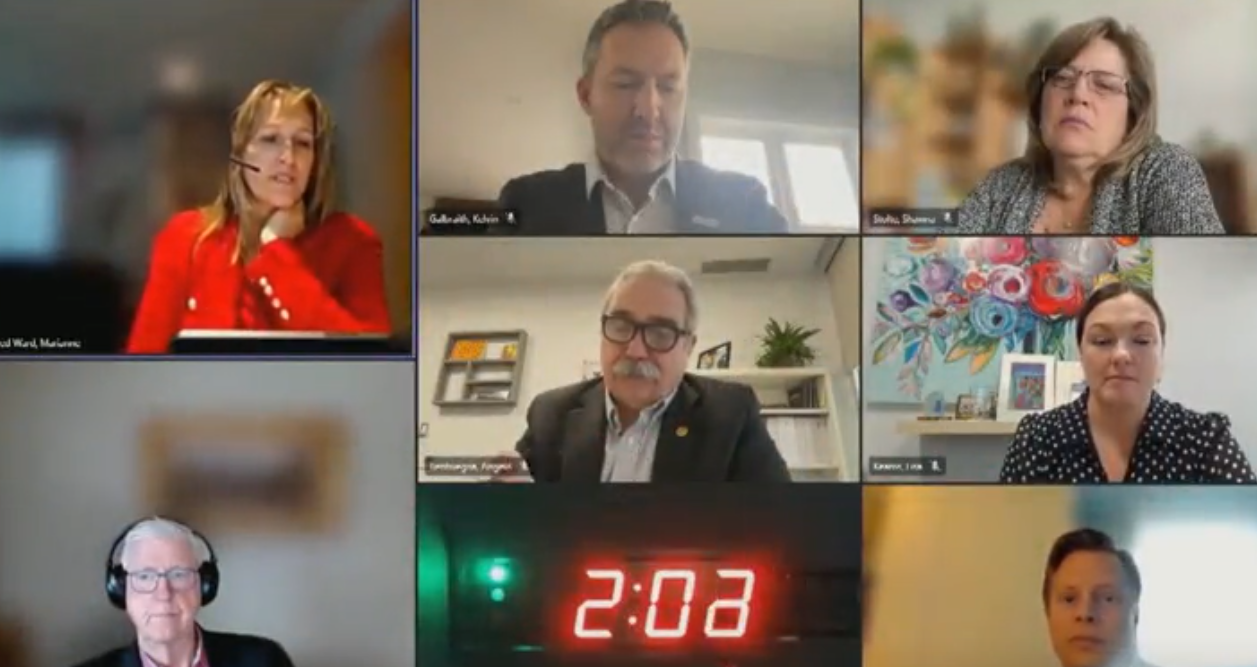 By Staff
By Staff
December 18th, 2023
BURLINGTON, ON
This article came from Canadian Press release; it was written by Brett McKay, Local Journalism Initiative Reporter, St. Albert Gazette
It was spotted by a Burlington Gazette reader who has been following the discussion in our comments section related to the dissatisfaction many have with the current City Council. Our point here is that community news from our perspective is community being a part of the process. Our hats are off to the reader who passed this along.
Are there ways – other than elections to remove members of a municipal Council?
The Alberta government dismissed the City of Chestermere’s mayor, half of its councillors, and all three chief administrative officers on Dec. 4. Though rare, the decision wasn’t without precedent. But what exactly does an elected official have to do for the province to step in and remove them?
Alberta Municipal Affairs Minister Ric McIver said in his decision such interventions should be reserved for cases where the public interest isn’t being served and the municipal government isn’t functioning.
In the case of Chestermere, council was dysfunctionally divided. Some felt bullied by the mayor and fellow councillors, councillors irregularly took on administrative tasks, audited financial statements were filed late, and staffers who objected to requests from the mayor or council were reportedly fired, according to a report from a consultant hired by the provincial government.

Burlington City Council minutes before the last Council meeting of the year was adjourned. Look hard for the happy faces.
The “irregular, improper and improvident” behaviour of elected officials that costs them their position often comes down to infighting, conflicts of interest, and shockingly bad decision making. told, 62 employees left the organization during the time the city was under review.
In 1999, the minister of Municipal Affairs fired the entire 10-member council of the Municipal District of McKenzie. The move was called unprecedented at the time, and the minister cited allegations of mismanagement and infighting as reasons for his unusual intervention.
The dismissal of the council followed only four years after council was first granted local autonomy and control over its spending. Prior to 1995, the M.D. of McKenzie had been an improvement district, managed directly by a municipal affairs administrator with a local elected council acting as an advisory board.
Now known as MacKenzie County — “the largest county in Canada” — the sprawling area in Northern Alberta includes La Crete, Fort Vermillion, and Zama City. Once council was handed control over its affairs, regional disputes quickly disrupted the administration.
“Seldom, if ever, can we recall any situation which parallels that which we found in the M.D. of Mackenzie,” a report commissioned by the provincial government concluded.
The report found the council had interfered with administrative decisions, exercised poor leadership, voted in blocs to further one region’s interests, and let ethnic, cultural, and religious differences interfere in decision-making. Members from Mennonite communities in the southern part of the county held half the seats on council, and there were complaints money was disproportionately being spent in the south.
Former councillor Bill Fedeyko told the Edmonton Journal members of the council were paying themselves handsomely to attend meetings, hiked taxes, and unjustifiably fired the director of utilities, leading to a pricey settlement.

The feud’s on Burlington City Council have yet to reach the level of the Hatfields and McCoys – still three years left in their term of office.
“The biggest thing was that council just couldn’t get along. The bickering was so bad it was just like the Hatfields and the McCoys,” he said.
Former municipal affairs minister Danielle Larivee fired three of five Thorhild County councillors in 2016 when they refused to hire a chief administrative officer (CAO) with experience.
Municipal affairs had provided a short list of approved administrators for the county to choose from to fill the CAO position. Council instead hired former Conservative MP Brian Storseth, who Larivee said didn’t have the skills or experience needed to do the job.
Why was the government sending Thorhild County a vetted list of administrators in the first place? The previous CAO hired by council, at cost of $151,000 per year, also had no qualifications or experience, was a friend of two councillors, and was connected to a group lobbying the council.
Poor hiring choices eventually forced the government to intervene but concerns over the performance of council went back years, with 20 per cent of the county’s residents petitioning for an inquiry in 2014.
A government-commissioned inspection of council turned up vitriolic and threatening emails, with councillors challenging each other to “settle conflicts outside.” This infighting also contributed to confusing and, at times, contradictory motions being passed.

The demolition failure at Bateman hasn’t been blamed on a janitor – Ministry of Labour is still investigating.
Before the councillors were removed, government officials had to step in when the contract to demolish a school was given to a county janitor, who planned to dispose of hazardous materials in an open burn-pit.
Not satisfied with how local reporters at the Redwater Review were covering its affairs, council spent $58,000 to bring in the Westlock News.
“Elected officials should not use the power of the public purse as a means to control a free media,” the investigators admonished.
Alberta introduced The Recall Act in 2022, which allows petitioners to recall MLAs, municipal officials, and school trustees. To recall an official, petitioners need to get 40 per cent of eligible voters in a municipality to sign on within 18 months of an election.
The Act was used for the first time this summer in the Village of Ryley to remove Mayor Nik Lee. During Lee’s tenure, the budget 2022 budget jumped from $1.7 million to over $3 million. Lee also charged the village $5,000 for attending meetings in the first two months of 2023.
Lee had previously been removed from council in 2021 after being disqualified for not paying his municipal taxes.















” The (Albertan) Act was used for the first time this summer in the Village of Ryley to remove Mayor Nik Lee. During Lee’s tenure, the 2022 budget jumped from $1.7 million to over $3 million.”
Almost the very first decision this Burlington City Council with Meed Ward as its elected Mayor made was to increase the cost of a previous elected council’s efforts to ensure Civic Square met 2016 accessibility standards from 1.1 million to 3.8 million. They also moved the completion date from September 2019 to 2025 putting the city and region at risk of a class action suit for those who the city, members of Council, Halton Health Board and Halton Medical Officer of Health knew were put at risk of falls and denied accessibility standards for the city since 2016.
Not to mention using rural funds to pay for a highly contentious rainbow cross walk, some light fixtures and furniture in the very urban downtown area near city hall.
40% of electorate petition might well work in little villages but not in cities where we cannot even get 40% out to vote. Keeping our municipalities accountable is the Province’s responsibility and the province needs to come up with a realistic way of ensuring such accountability as did Alberta, however, with a different means. What we have now has been proven not to work since at least 2014. January 11, 2024 Halton Governance hearings is the place for dissatisfied with Burlington and Halton council for a workable Recall Act for municipal councils and the criteria for its use and apply it asap if Burlington and Halton meet that criteria. Any Act that includes escalation of taxpayers costs by 100% + for a previously approved project to meet safety and access standards and/or substantial delay of such, should be top of the list as should any decisions that meet the criteria set out in the Criminal Code of Canada such as municipal corruption, criminal negligence causing bodily harm or death or fraud